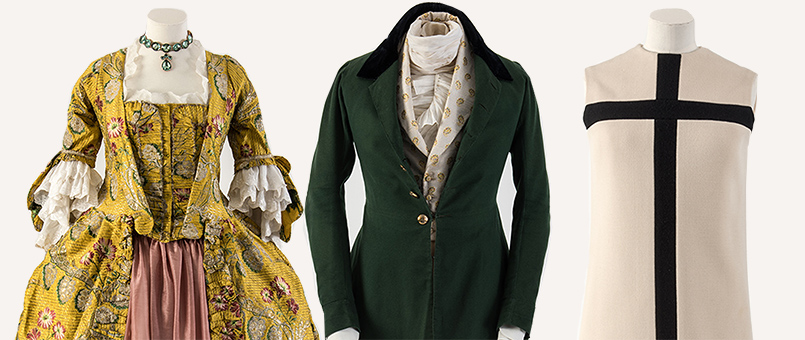
Fashion through the ages
The Fashion Museum Bath is one of the world’s great museum collections of historical and contemporary dress, located in the World Heritage City of Bath, which has been described as “… one of the most beautiful small cities in England”. The Fashion Museum is currently presenting an exhibition ‘A History of Fashion in 100 Objects’ (continuing until 1 January 2019) showcasing 100 star objects drawn from the collection. From a blackwork embroidered shirt from the time of Shakespeare to an electric blue ensemble by leading British menswear designer Craig Green chosen as the Museum’s Dress of the Year 2015, this exhibition gives a glimpse not only of the museum’s magnificent collection but also of fashion and style in the last 400 years.
Take a look at our Top Ten favourites from the collection.
17th Century: Stuarts, Puritans and Decadence
This linen shirt was characteristic of the times. With full sleeves, deep cuffs and embroidery, it gives an air of extravagance that was made popular by the Royals Courts but shunned by the Church.
Man’s blackwork embroidered linen shirt, 1600s (linen), Unknown Artist, (17th century) / Bridgeman Images
18th Century: Georgian times
Low-necked (often square) gowns were all the range in the late 1700’s, as you can see from the next two dresses.
Yellow and gold woven silk robe à la française, 1760s (silk), Unknown artist, (18th century) / Bridgeman Images
18th Century: Georgian times (continued)
Hoop skirts were commonly worn to get make those hips looks extra voluptuous!
Cream striped and figured woven silk robe à la française, 1770s (silk), Unknown artist, (18th century) / Bridgeman Images
19th Century: Regency period
At the start of the century, waistlines were still rather high – directly under the bust. This embroidered cotton gown shows the love of frills!
White cutwork embroidered cotton gown with spencer-style bodice, 1815 (cotton), Unknown Artist, (19th century) / Bridgeman Images
19th Century: The Rise of the Dandy
In the early 19th century dandies often wore boned corsets to make their waists appear smaller. This century saw men begin to favour long trousers rather than knee breeches. Trousers became increasingly fashionable for formal and informal wear.
Man’s green wool cloth coat, with wool trousers and woven waistcoat, 1830s (wool), Unknown Artist, (19th century) / Bridgeman Images
19th Century: Victorian era
During the mid-late 1800’s, the skirt was very full and worn over a cage crinoline. A boned corset was worn over a chemise.
Biscuit and rose-coloured silk day dress, 1886 (silk), Nicholson & Wordley (19th century)
20th Century: The Turn of the Century
This beautiful silk wedding dress was not of its time. Made in 1908, the fashion of the day was high necklines, not square, and its delicate beading could be more commonly associated with the 1920’s.
White silk wedding dress with bugle-bead embroidery, 1908 (silk), Lucile & Co. / Bridgeman Images
20th Century: The Dirty 30’s
The 1930’s may have been rife with economic and political problems throughout the Western world, but the fashion proved as glamorous as the prior decade. This ivory evening gown was created in Paris.
Ivory ‘crinkle’ weave synthetic evening gown with red velvet feature back, 1930s (synthetic fabric & velvet), Donguy / Bridgeman Images
20th Century: The Swinging 60’s
If 1960’s fashion is known for one thing it is the mini dress. The Yves Saint Laurent design bucks the trend of psychedelic colours, but looks all the more chic for it.
Cream and dark navy blue wool jersey ‘Mondrian’ dress, 1965 (wool), Yves Saint Laurent (1936-2008) / Bridgeman Images
21st Century: 2010s
Craig Green’s winning design from Fashion Museum Bath’s Dress of the Year. The electric blue outfit may not be worn to your local supermarket but is emblematic of the times. Gender neutrality in clothing is a trend that keeps on growing.
Electric blue long cotton shirt and plastic quilted jacket ensembles, 2015 (cotton & plastic), Craig Green (b.1986) / Bridgeman Images
Find out more
Explore the whole collection from the Fashion Museum Bath.
Visit the A History of Fashion in 100 Objects exhibition.

